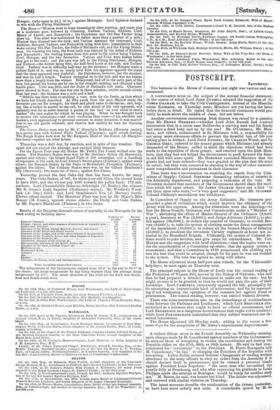POSTSCRIPT.
SATURDAY.
The business in the House of Commons last night was various and, un- connected.
A conversation arose on the subject of the annual financial statements in the course of which Lord Joan RUSSELL adopted the suggestion of Sir Jamas Gaastax, to take the Civil Contingencies, instead of the Miscella- neous Estimates, on Thursday next; Members not yet having the latter before them in detail. He stated that the financial statement would pro- bably be made about the middle of June, but not before.
Another conversation concerning Irish distress was raised by a question from Mr. HENRI' HERBERT—whether Lord John Russell had received information that in a union near Balfinrobe, a starving man and his family had eaten a dead body cast up by the sea? Mr. O'CoNsinus Mr. Most- SELL, and others, endeavoured to fix Ministers -with a responsibility for not using more strenuous efforts to prevent the dreadful loss of life now taking place in Ireland. Lord Joins Russnut, Sir CHARLES WOOD, and Sir GEORGE GREY, ,referred to the money-grants which Ministers had already demanded of the House; called to mind the objections which had been made to the repetition of those grants; and retorted upon the Irish Mem- bers, that they had not helped the Government to push forward the Rate- in-aid Bill with more speed. Mr. Isloasmax reminded Ministers that the grants had not been refused—they were granted on the plea that life must be saved; but they were censured as standing in the way of other measures more comprehensive and permanent in their character.
Then there was a conversation on receiving the report from the Com- mittee of Supply; Colonel SIBTHORP demanding reduction of salaries in the Admiralty department, and proposing a reduction of the vote. Mr.. Sroosusu insisted that members of the Government should share the sacri- fices which fell upon others. Sir JAMES GRAEIA.M threw out a hint "to put them upon corn-rents,"—" a very good suggestion," said Mr. Sroonnirs Colonel Sibthorp's amendment was withdrawn.
In Committee of Supply on the Army Estimates, Mr. OSBORNE pro- pounded a plan of reductions which would improve the efficiency of the Army with less expense. Among the alterations were the following,—to fuse the Horse Guards, Ordnance, and Commissariat, under a "Minister of War "; abolishing the offices of Master-General of the Ordnance (9,0001 a year), Secretary at War (5,0001), and Judge-Advocate (2,0001); to abo- lish agency (36,0001); to reduce the number of Generals; to abolish Bre- vets (8,0001.); to take the system of clothing under the direct management of the department (35,0001); to reduce all the Second-Majors of Infantry (45,0001.); to condense the seventeen Cavalry regiments at home not in- cluded in the Household Brigade. Ultimately, the system of Colonial de- fence would require revision, and give scope for retrenchment. Mr. Fos MAULE met the suggestion with brief objections,—that the topics were un- der the consideration of a Committee up-stairs; that the agency system is economical; and that a Committee in 1833 pronounced the clothing sys- tem the best that could be adopted, though for his part he was not wedded to the system. The vote was agreed to, along with others.
The House adjourned about half-past nine o'clock, for the Whitsuntide, holydays; to meet again on Thursday next.
The principal subject in the House of Lords was the second reading of the Protection of Women Bill, moved by the Bishop of OXFORD; who said that he had prepared a detailed statement to make out his case; but he might assume it to be granted, so that he would not pain the ears of their Lordships. Lord CAkLPBELL strenuously opposed the bill, principally fot its attempting an impracticable kind of intervention, and for its supersed- ing if not weakening the operation of the common law against fraud or procuration. The second reading, however, was carried without division.
There was some conversation also on the interchange of multitudinous visits between the Parisians and Londoners; which Lord Bitouosuat cha- racterized as a nuisance that ought to have no offieial countenance, and Lord REDESDALE as a dangerous inconvenience that ought not to continue; while Lord BREADALBANE maintained that they neither warranted nor de- served interference.
The House adjourned till Monday week; adding to the recess a few more days for the completion of Mr. Barry's experimental improvements.


























 Previous page
Previous page